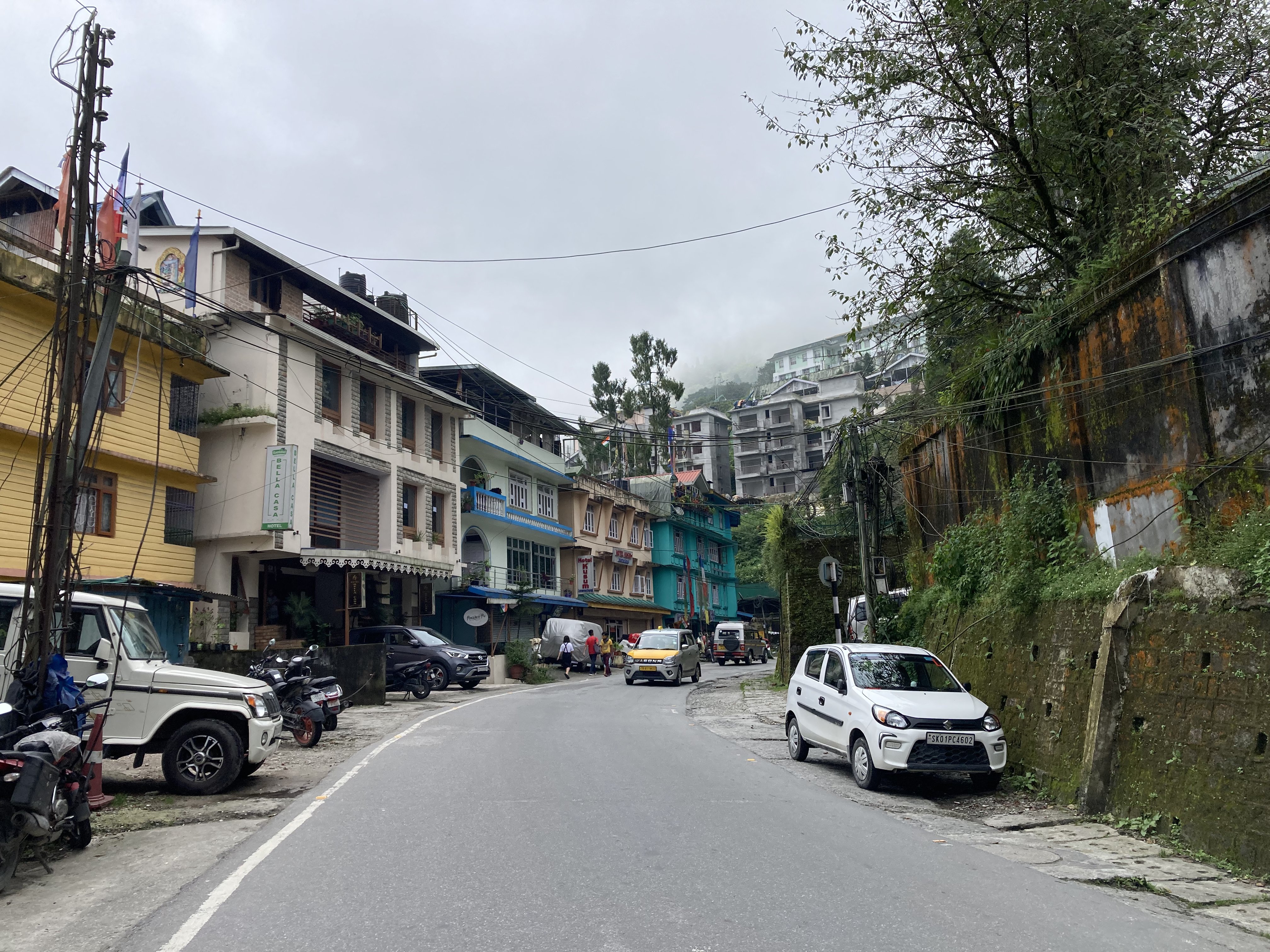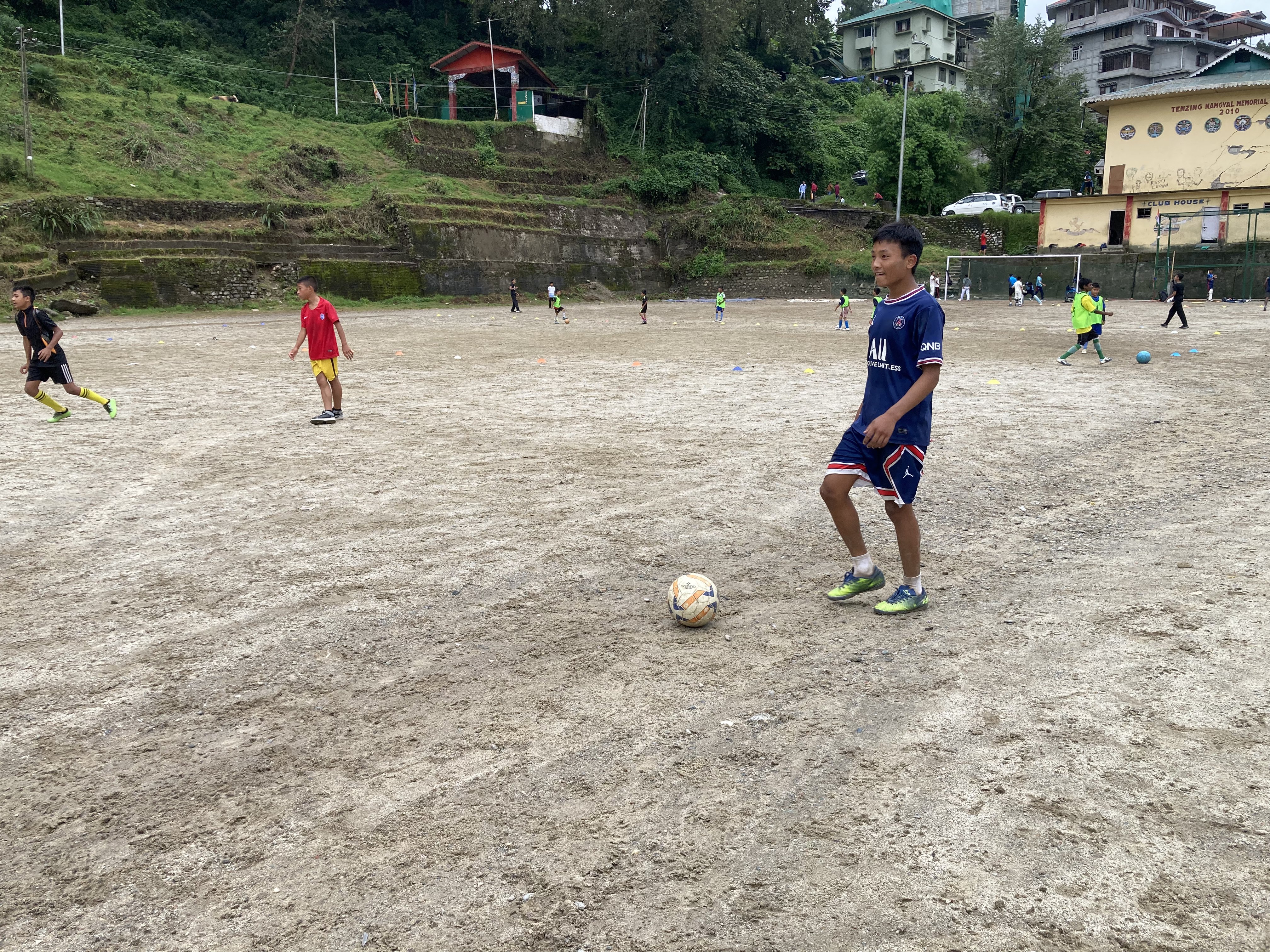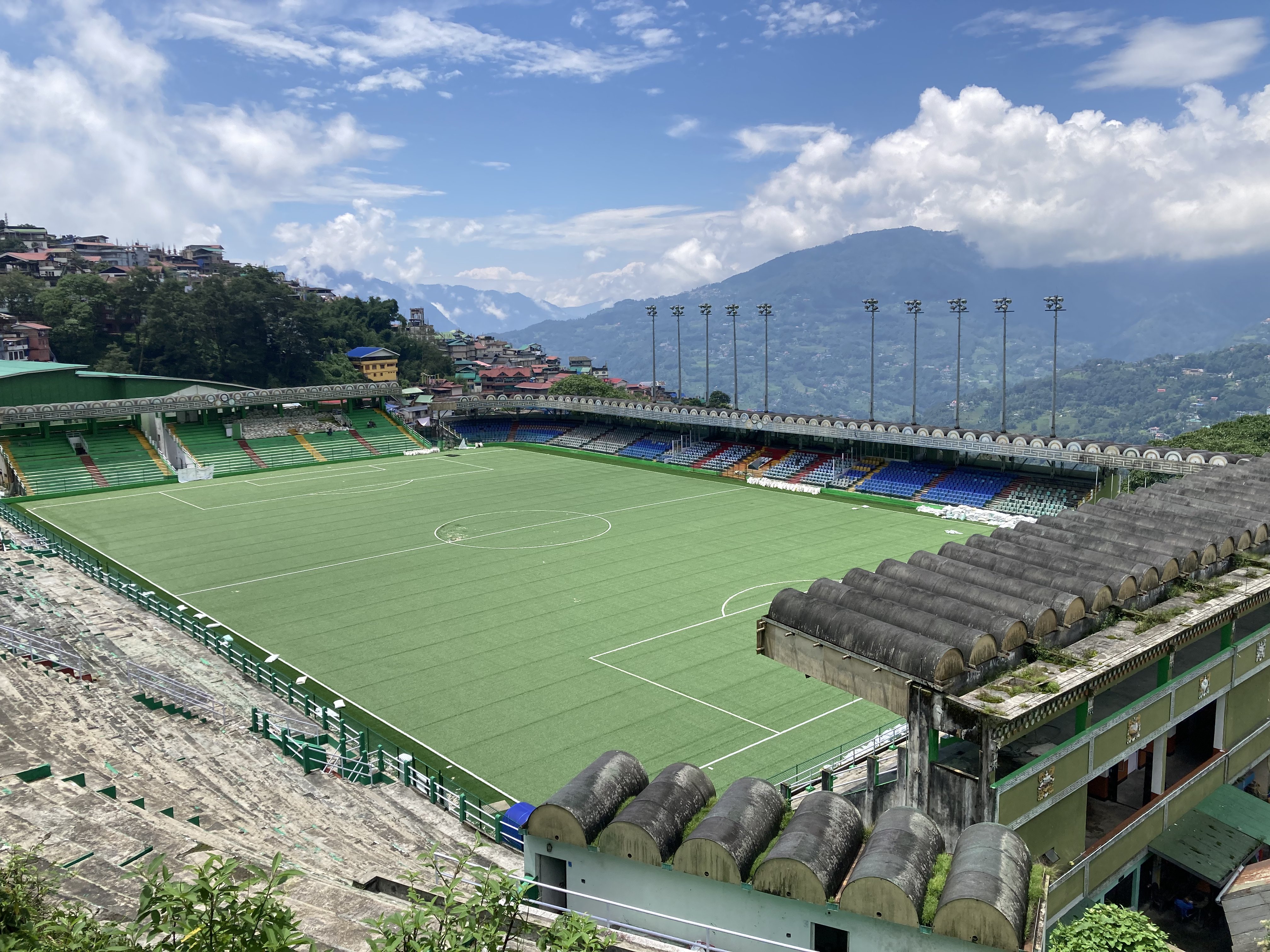
Gangtok, Sikkim – On a cool monsoon morning, as a layer of mist hung over the lush hills in Gangtok, a group of young students wearing bright yellow, orange and green jerseys kicked about on the football pitch of the Tashi Namgyal Academy (TNA).
For Simon Subba, who often guides young footballers, the sight of a kickabout triggered a flood of memories.
“It used to be just sand here when we played. Now there is a good astroturf,” Subba recalled.
Nestled in a leafy part of the burgeoning hill station, TNA is the most prominent school in Gangtok. It is named after the eleventh ruler of the erstwhile Himalayan kingdom of Sikkim which became part of India in 1975.
The school is also known for its most notable alumnus – India’s star footballer Bhaichung Bhutia. The pavilion, where the parents sat watching their kids train, is named after him.

In this small state, surrounded by Bhutan and Tibet and with a population of about 600,000, Bhutia commands the status of a hero.
“For the football enthusiasts, he is a hero,” an academic, who wished to remain anonymous, explained as he sipped beer at a Gangtok pub.
There are many such pubs on this road which serves as the commercial centre of the city. It is the best-known part of Gangtok and is popular equally with tourists and locals.
In the last 15 years, small shops of yore have given way to big restaurants and hotels.
A red panda statue, the state animal of Sikkim, at one end of the road and that of Mahatma Gandhi on the other welcome the visitors.
“People of Sikkim remember and respect him as someone who put the small state on the national map with his incredible game,” the academic added as he meandered to Bhutia’s foray into politics.
Bhutia is now trying to find his feet in politics. He first contested Lok Sabha – the national elections – in 2014 from Darjeeling in the neighbouring West Bengal state. He then contested state elections from Siliguri, also in West Bengal. He ended up winning neither.
In 2018, Bhutia made forays into politics in Sikkim and formed his own political party called Hamro Sikkim Party (Our Sikkim Party). He contested elections in 2019 but lost again.

Bhutia’s football magic
In the 1990s and 2000s, Bhutia’s magic on the field brought football back into contention in the cricket-crazy country.
In a long international career, from 1995 to 2011, much of which was spent leading the Indian team, he became the first footballer to play 100 matches for India and the first to sign a contract with a European club.
His exploits, like the 1997 Federation Cup semi-final, where he became the first player to score a hat-trick in the Kolkata derby when East Bengal trounced Mohun Bagan 4-1, won him the title of Sikkimese sniper.
Subba, a professional footballer during his youth, was Bhutia’s contemporary at the TNA.
“He was two years senior to me,” Subba said, pointing to a yellow building with a green roof on the other side of the pitch. “That’s the hostel where we lived.”
Born in a family of farmers in south Sikkim’s Tinkitam village, Bhutia was always passionate about football.
“The family used to grow ginger on a farm. He once told me how he used to sell his share of ginger at a local market and then buy football with it,” Subba recalled.
When Bhutia was growing up, the roads in rural Sikkim were either non-existent or in a bad shape. Quality education was not available.
Those with means would go to boarding schools in Gangtok or Darjeeling. That is why Bhutia landed up in Pakyong, a town 25km (15.5 miles) from Gangtok.

Pakyong is now home to the small state’s only civilian airport, counted among the world’s most beautiful ones where the rare flight landings are only on days when the weather is kind. The town also hosts a national orchid research centre and one of Sikkim’s well-known educational institutions – St Xavier’s School – where Bhutia first studied after he stepped out of Tinkitam.
“Bhaichung was a terrific goal scorer even when he was at St Xavier’s,” recounted Devendra Gurung, a Gangtok-based politician who was with Bhutia at Xavier’s and refers to him as one of his oldest friends.
Around India’s Independence Day celebrations on August 15, every small town and village hosts football tournaments. For Gurung and Bhutia, these tournaments translated into dozens of goals.
“Whenever we were playing [for the school team], the score used to be 23-0, 24-0 in our favour. And most goals would be scored by Bhaichung,” Gurung said.
But the goals did not come easy. The two would wake up early to train. While Bhutia lived in a room below the school building, Gurung’s hostel was above it.
“I would tell Bhaichung to sleep on the bunk bed close to the window so that it’s easy to knock from outside and wake him up,” Gurung said.
The two friends studied in Pakyong until grade six when they were among the five students chosen by the Sports Authority of India (SAI) for football training.
They were then sent to TNA, which had been adopted by SAI with sports coaches posted there. Bhutia’s love for football grew once he was at TNA.
“Often, I would find him kicking the ball all by himself,” Gurung said.
Subba, too, remembered Bhutia playing football all the time.
“When everyone was studying, Bhaichung would be still on the field,” Subba recalled, adding how Bhutia would be the last to leave the pitch for the evening preparatory lectures.
But in school, Bhutia was good at not just football.

“Except swimming, he was part of all sports teams,” said Pushkar Khatiwara, another TNA alumnus, as he watched his child train on the astroturf. “Bhaichung always gave his 100 per cent.”
“He was an all-rounder, except in studies,” Sherap Lepcha, manager at the Deltin Denzong casino in Gangtok, joked.
Lepcha, who was among the five kids chosen by SAI, recalled their coach at the school would go plead to other teachers on behalf of Bhutia and him to ensure that they were given the minimum passing grade.
“Bhaichung had extra talent. He has a natural gift,” said Karma Bhutia, a retired football administrator who was instrumental in helping Bhutia, Lepcha and others get a foothold in professional football.
After returning to Sikkim in 1978, Karma, then employed with the Public Works Department, started The Boys Club. It was in the late 1980s that Karma noticed Bhaichung, Sherap and Devendra at the TNA.
“I used to keep going there and watch them play,” Karma said.
He is the one who chose Bhutia for the Sikkim senior football team and later pushed him to join the East Bengal club in Kolkata.
“Karma sir turned out to be a godfather-like figure for us,” Lepcha said. “He is the one who did everything for us. When Bhaichung and I left our small villages to study, we barely had any money.”
Lepcha comes from a family of farmers in Dzongu, a scenic valley in North Sikkim reserved for the Lepcha people, a mostly Buddhist Indigenous group in Sikkim and Nepal.
During short vacations, going home was not an option due to limited finances. They would either stay at the hostel or go to Karma or Devendra Gurung’s house.
“This is where we would kick around during vacations,” said Subba, who lives a short distance from Gurung’s then-residence, pointing to the road outside his house in the Development Colony neighbourhood of the city.
The street is now a row of houses, shops and ATMs and is usually teeming with cars, scooters and pedestrians except for a small opening where one can get an occasional view of Kangchendzonga mountain.
“It used to be empty those days,” Subba said.
“The city was very different then,” said Lepcha.

The hill station, now a major tourist destination, is expanding to cater to visitors. Many from the state’s rural areas, too, have moved to the city for better opportunities. On a normal day, the city is chockablock with traffic and tourists.
“It is a concrete jungle now,” Lepcha rues as he ate at the Deltin Denzong’s restaurant which offers a panoramic view of the centre of Gangtok city.
Besides football, it is the love for momos and thukpa that kept the group together.
The students on the SAI scholarship received 50 Indian rupees [then $3.5] a month from the school. All of that would be spent eating thukpa, momos and chowmein at the Lhakpa Hotel, near the Paljor stadium in Gangtok, where they would go and play the tournaments.
The stadium, currently under renovation, is also the home ground for United Sikkim FC, the club founded by Bhutia.
“We played for thukpa and momos those days,” Lepcha said.
The group of friends used to have bets on eating and the one who would eat the least would have to pay.
“Bhaichung never ended up paying,” Gurung recalled as he burst into laughter.
Even these days, when Bhutia visits Lepcha at the restaurant and the casino, he tells him in advance to keep the momos ready.
“He still loves food,” Lepcha said. The two have remained close friends. Both their teenage sons also play football and go to the same school in Siliguri city run by Bhutia.
“He is still in touch with all his friends. As is he is growing old, he has only grown more humble” Lepcha said.







